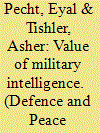| Srl | Item |
| 1 |
ID:
136962


|
|
|
|
|
| Summary/Abstract |
Previous empirical studies on the defense spending-economic growth nexus such as Kollias et al. (2007), Mylonidis (2008), Dunne and Nikolaidou (2012) analyzed this relationship in the case of the EU15. This study extends the analysis with the inclusion of more EU members and investigates the long run causal ordering between the two variables. Findings reported herein are not uniformed across all EU members. It is also found that end of Cold War has significant negative impact on defense expenditures of former east-European countries.
|
|
|
|
|
|
|
|
|
|
|
|
|
|
|
|
| 2 |
ID:
136958


|
|
|
|
|
| Summary/Abstract |
A number of studies have examined the link between rainfall and conflict but results so far have been inconclusive. This study examines the effect of rainfall on economic performance in different sectors and conflict onset. The empirical analysis finds no support for a strong relation between rainfall and conflict as most results are not robust to different model specifications. The results also do not provide conclusive evidence for a link between growth in specific economic sectors and civil conflict onset.
|
|
|
|
|
|
|
|
|
|
|
|
|
|
|
|
| 3 |
ID:
136961


|
|
|
|
|
| Summary/Abstract |
The purpose of this paper is to analyze the defense interdependence between Japan and the United States (US) in the short and long run and to investigate whether Japan is a follower or a free rider of the “US” over the 1975–2009 period. Given that mutual aid between Japan and the US has been maintained, the empirical results suggest that Japanese defense has a stable relationship with US defense. Furthermore, the results reveal that Japan is not a free rider but rather a follower in the period under consideration.
|
|
|
|
|
|
|
|
|
|
|
|
|
|
|
|
| 4 |
ID:
136960


|
|
|
|
|
| Summary/Abstract |
The issue of guns or butter is one of the most fundamental economic questions, yet there is no consensus on a theoretical framework for examining it. Over the last decade, a version of a simple Keynesian macroeconomic model has been applied a number of times to examining the link between defence spending and economic growth in a range of countries. There are reasons for doubting the soundness of this model as a basis for empirical work.
|
|
|
|
|
|
|
|
|
|
|
|
|
|
|
|
| 5 |
ID:
136957


|
|
|
|
|
| Summary/Abstract |
It is generally deemed that domestic and transnational terrorism respond to different types of events. This study updates Enders, Sandler, and Gaibulloev’s previous analysis to include data through the fourth quarter of 2010 and provides analysis of terrorism at the regional level. Vector autoregressions are used to show that previous findings are accurate on the whole, but that there are important differences between regions. Notably, the Granger-causality for the world depends on whether Iraq and Afghanistan are included in the sample, and impulse response functions highlight the persistent effect a shock to transnational terrorism can have on domestic terrorism.
|
|
|
|
|
|
|
|
|
|
|
|
|
|
|
|
| 6 |
ID:
136959


|
|
|
|
|
| Summary/Abstract |
This study evaluates the role of military intelligence in an arms race between two countries. The intelligence apparatus of each country evaluates the rival’s capabilities and intentions, and enhances its military capability by increasing the effectiveness of its own weapon systems and reducing the effectiveness of the rival’s weapon systems. Intelligence superiority also yields an advantage in deterrence and preemption. This study shows the following. (a) Investment in intelligence is much less beneficial for small government budgets, low intelligence efficiency, and a low degree of conservatism on the part of the policy-maker. (b) The expenditure on intelligence increases when intelligence efficiency is low and rising, and decreases when intelligence efficiency is high and rising. (c) Being very conservative may be costly to the country. (d) High-quality human capital substantially improves the country’s security and welfare, particularly when the rivals are engaged in a knowledge race in addition to the usual arms race. An application of the model to the Israeli–Syrian arms race demonstrates its validity and usefulness.
|
|
|
|
|
|
|
|
|
|
|
|
|
|
|
|